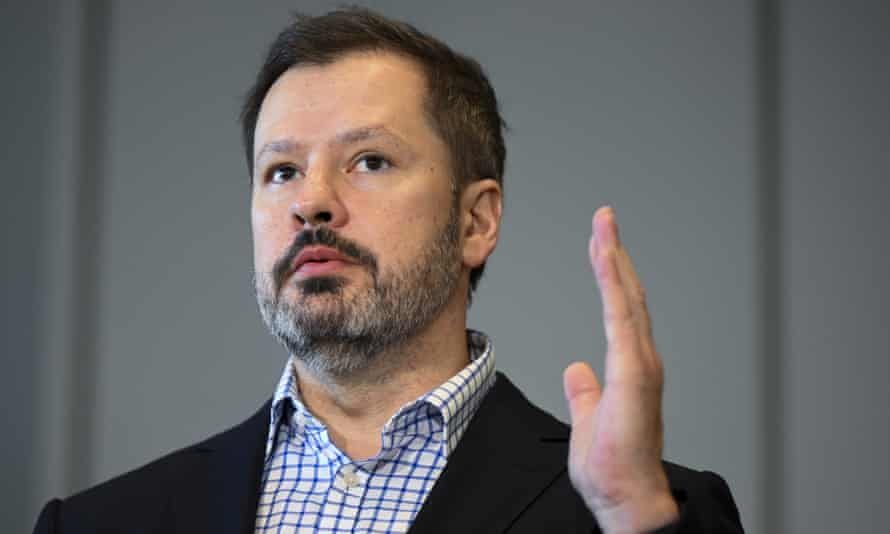
Federal government agrees to extend Covid funding arrangement until end of year
The PM has begun by welcoming the meeting of national cabinet for the first time since the election, and announced the government will extend its Covid funding arrangement until 30 December.
It was conducted in a very good spirit, a spirit of engagement, one that recognised our common interests and our common purpose to serve people and our respective state and territories – from my perspective, to serve people around the nation. There was a focus, of course, on the response to the health pandemic, which we know is ongoing.
And in recognition of the pressure that health and hospitals continue to be under, the commonwealth has agreed to extend the Covid funding arrangements until the 30th of December this year. There are some arrangements in place as well about some of the measures not being continued beyond September because it was agreed that they were not necessary. Importantly, we’ve agreed as well that … Glen Davis, the head of the department of Prime Minister and Cabinet, will conduct a process review of health funding and health arrangements, looking at health reform.
What that is about isn’t necessarily additional dollars. What it’s about is a recognition that our hospital system at the moment has people who should be looked after by their local GP … That the lack of nurses and health professionals in the aged care system means that many people who should be either being looked after at home or looked after as aged care residents end up in the hospital system as well as putting further pressure on the system.

Daniel Hurst
A small update on another meeting happening today: the foreign affairs minister, Penny Wong, is in Solomon Islands and has met with the prime minister, Manasseh Sogavare.
”Nice to see you,” Sogavare said as he greeted Wong, in clips released by the minister’s office.
Sogavare and Wong exchanged gifts before the meeting began.
We expect to hear from Wong at a press conference in about four hours from now. She is also expected to participate in several community events.
SA premier ‘grateful’ to be noticed by Vladimir Putin
So that press conference has ended, but I just want to back over some answers given, including South Australian premier Peter Malinauskas speaking about his Lithuanian heritage when discussing his inclusion on the list of Australians banned from travelling to Russia.
I’m just grateful that Vladimir Putin took notice.
I am very grateful for the fact that Vladimir Putin has paid attention to the leading role that South Australia is playing, for standing up for the democratic values that we collectively as a country hold dear.
My heritage, my family knows all too well the human tragedy that can occur in the face of unacceptable Russian aggression and I am very proud of the fact that my government has played a leadership role and look forward to doing that in the future.
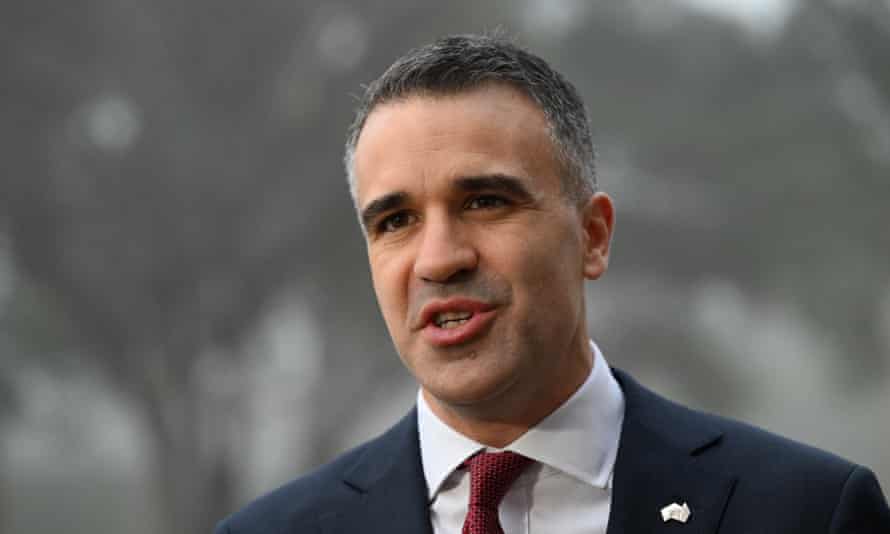
Albanese on migration and skills shortages: ‘We are working on those issues’
So, final question is on skill shortages and whether there will be any migration program introduced to deal with the issue.
The PM says:
We are working on those issues. We are a government that have been in place for a matter of weeks. Just weeks. So we’re working on issues with the department appropriately and I’ve discussed with the minister for home affairs as well as the minister for women as well as Brendan O’Connor who has the response and skills and trainings, on how we deal with these issues.
In the immediate sense though, in the sense of the week that I became prime minister, I directed (before the ministers were appointed to those jobs), I directed the departments to look at the backlog and indeed in the meetings that I had prior to the election I foreshadowed to departmental heads that there was something that we needed to address … we got departments ready to act.

Paul Karp
More on national cabinet secrecy …
Before the election Anthony Albanese was a fierce critic of national cabinet secrecy.
When he had his own FOI request for national cabinet documents rejected by the department of prime minister and cabinet, Albanese said it was “extraordinary” and accused Scott Morrison of an “obsession with secrecy”.
The then shadow attorney general Mark Dreyfus also told the Canberra Times Labor would unwind the legal fiction that national cabinet is a subcommittee of federal cabinet, which allowed the government to block FOIs.
In March, Dreyfus reportedly said:
As [ACT chief minister] Andrew Barr has observed, ‘national cabinet is reaching the end of its fairly limited lifespan’. But Labor’s position is that it was never subject to cabinet-in-confidence rules for FOI requests, and we would adhere to this in office.
At the first meeting of national cabinet under Albanese on Friday, he was asked if he had proposed ending the secrecy and if not “what changed”.
Albanese said: “No” and “you got to ask one question”.
So, a backflip retaining secrecy and then choosing not to even explain why.
Daniel Andrews says politics was ‘put aside’ during meeting
Politics was put aside at this meeting and we have put patients first and that is the most important thing … another test for all of us will be to work hard in the weeks and months to come, to come up with practical ways in which we can make the system work – GP primary care as well as hospitals, NDIS clients, aged care residents. I think we can do that … we have put patients first and there is perhaps nothing more important than that.
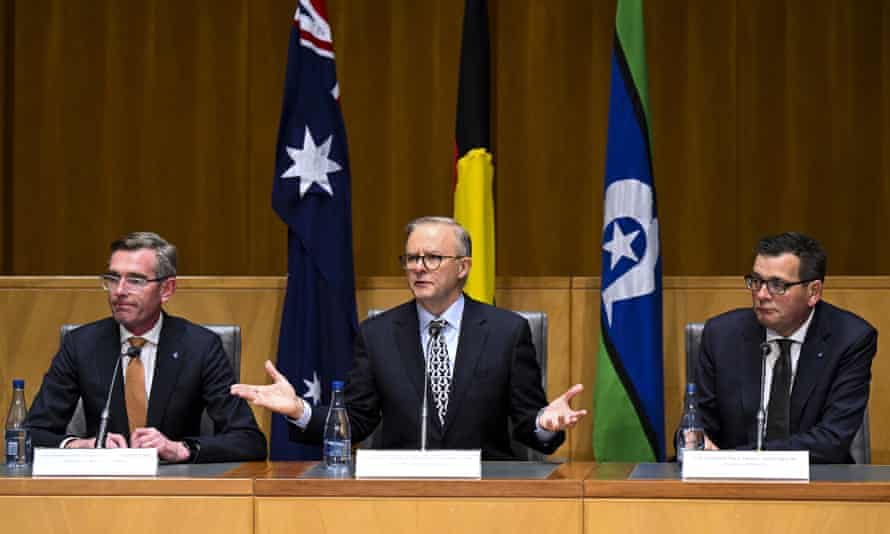
Dominic Perrottet says health funding a ‘great start’
NSW premier Dominic Perrotet is asked what he thought of the agreement to continue the Covid-era agreement on health funding, and gives a positive outlook:
This is a great start. This is something we have been discussing at national cabinet for some time, so to have the first meeting today and for this matter to be resolved in some degree, to be extended to December, I think is incredibly welcome and supported by every state premier and chief minister.
But also I think in addition to that today, what is incredibly pleasing is a real focus of working with the states and territories in relation to substantive health reform going forward. This is something that has been in the too hard basket for too long. We certainly got a sense today from the prime minister that we came back to national cabinet for the budget. That is reassuring; there are areas where we can provide further support for our health systems right across the country.
They are all going through a challenging time, not just through Covid but obviously the impact of that going forward, and the lack of integration between the GP network and primary care and the public health system is a challenge that every jurisdiction is facing. Working closely with the commonwealth government I think there is great opportunity for substantive reform in that space because the prime minister has said this is not about money, it’s about working together on substantial reform and I thought today’s national cabinet was refreshingly collaborative.
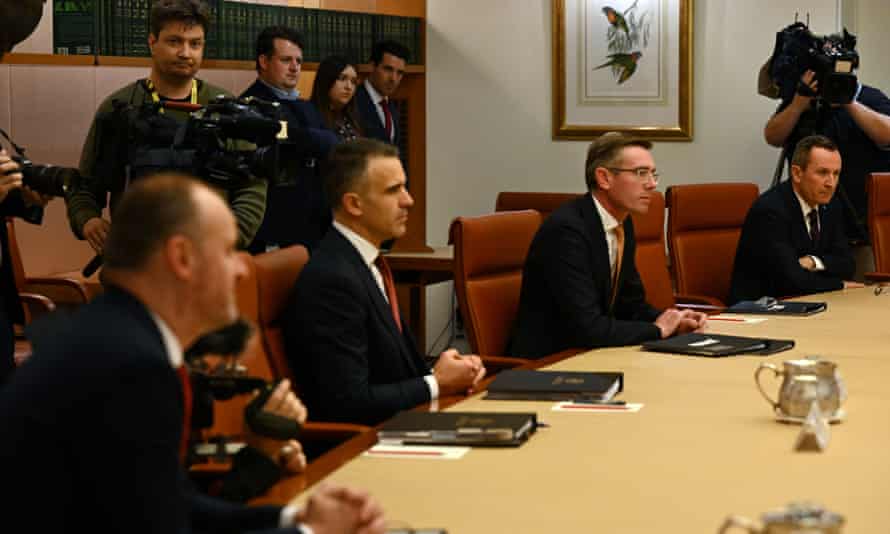
Albanese is asked about national cabinet secrecy
First question goes to the Guardian’s Paul Karp, who asks if Albanese brought up national cabinet secrecy, referring to Albanese saying last year Scott Morrison was “obsessed with secrecy”.
Albanese dismisses the issue, answering with one word:
No.
Cabinet agrees to meet a minimum of four times a year
Finally, the PM rattles off a series of agreements, including that the national cabinet will invite representatives of local governments in future meetings, announcing he will speak at an advanced economies forum convened by President Biden, and that they will meet again before the next federal budget.
The national cabinet agreed as well that we will invite a representative of local government to a future meeting of the national cabinet and the Treasury body once a year to each of those meetings to ensure that all levels of government are able to be involved.
The national cabinet has agreed to meet a minimum of four times a year or as necessary. Will meet prior to the federal budget, which will be handed down in over 2022.
States and territories support move for referendum on voice to parliament
The PM has continued, saying the leaders of state and territories have supported the commonwealth government’s moves to hold a referendum on a constitutionally enshrined voice to parliament.
Can I say as well that the states and territories expressed their support for the commonwealth’s commitment to progress a referendum for a constitutionally enshrined voice to parliament. As one of my colleagues
here said: if not now, when?And we’re very concerned that five years after the statement from the heart, this reform will just drop off. It is something that’s got to be progressed this year and this term and that is why [we need] the support of the states and territories. Constitutional change requires four out of every six states with the majority across the country in order to be improved.
Albanese opens door to migration as short-term solution to skills shortages
Next up, the PM is addressing skills shortages, opening the door for migration as a short-term solution:
The second issue that we dealt with today was the issue of skill shortages. It recognises that we need to train Australians for the needs of the day but also the jobs of tomorrow. And we need to work on a national skills plan in order to deliver that.
But it’s also to recognise that short-term shortages mean that we need to one: work on clearing the backlog from people who have visas that have been granted and waiting 12 or 18 months before they are actually able to take their place in workplaces around the country.
That’s placing pressure in construction, in infrastructure, leading to increased costs, also taking and putting pressure on service delivery. And short-term migration will need to be a part of the solution to skill shortages and we will work with the business community … cooperatively to address those issues.

Federal government agrees to extend Covid funding arrangement until end of year
The PM has begun by welcoming the meeting of national cabinet for the first time since the election, and announced the government will extend its Covid funding arrangement until 30 December.
It was conducted in a very good spirit, a spirit of engagement, one that recognised our common interests and our common purpose to serve people and our respective state and territories – from my perspective, to serve people around the nation. There was a focus, of course, on the response to the health pandemic, which we know is ongoing.
And in recognition of the pressure that health and hospitals continue to be under, the commonwealth has agreed to extend the Covid funding arrangements until the 30th of December this year. There are some arrangements in place as well about some of the measures not being continued beyond September because it was agreed that they were not necessary. Importantly, we’ve agreed as well that … Glen Davis, the head of the department of Prime Minister and Cabinet, will conduct a process review of health funding and health arrangements, looking at health reform.
What that is about isn’t necessarily additional dollars. What it’s about is a recognition that our hospital system at the moment has people who should be looked after by their local GP … That the lack of nurses and health professionals in the aged care system means that many people who should be either being looked after at home or looked after as aged care residents end up in the hospital system as well as putting further pressure on the system.
The PM has just begun speaking after his first national cabinet meeting.

Daniel Hurst
ANU voices support for Australian academics sanctioned by Russia
The Australian National University says it will support its academics as they speak out about the war in Ukraine, after four were included on a list of sanctions announced by Russia overnight. The list of Australians subjected to travel bans announced by Russia includes:
- Professor Brian Schmidt, ANU vice-chancellor
- Emeritus Professor Paul Dibb, ANU Strategic and Defence Studies Centre
- Professor John Blaxland, ANU Strategic and Defence Studies Centre
- Associate Professor Matthew Sussex, ANU Strategic and Defence Studies Centre
A spokesperson for ANU said in a statement issued a short time ago:
Earlier this year ANU cut all institutional ties with Russia in response to its illegal invasion of Ukraine. That position remains in place.
Our academics play a pivotal role in helping Australia and the world better understand complex issues every day – including war. We will continue to support our experts to speak about the war in Ukraine and its tragic consequences.
ANU stands with everyone affected by this war.
Sussex also tweeted about being on the list:
Over the past few months, Australia has joined close partners in expanding its own sanctions against Russian political and media figures over the invasion of Ukraine.
PM and premiers to speak soon
The Prime Minister is in Canberra today with First Ministers and will hold a press conference at 11:15AM #auspol
— Political Alert (@political_alert) June 17, 2022
Simon Birmingham admits to ‘missed opportunity’ on energy
Opposition foreign affairs spokesman Simon Birmingham has said the Coalition’s lack of an energy plan was the “missed opportunity of the last decade”.
Birmingham was discussing the Coalition’s failure to establish a framework like the National Energy Guarantee on Sky News this morning, and admitted his government was culpable for some of the issues leading to the energy crisis:
And one of the things that I think was a missed opportunity of the last decade was the type of measures proposed in the National Energy Guarantee.
Which was to make sure we had a framework to reduce emissions and to achieve lower emissions electricity generation but, at the same time, effective obligations to keep reliability in the energy markets as well.
Australian stock market plunges again
The local stock market has plunged again, dropping to its lowest level since November 2020, AAP reports.
The benchmark S&P/ASX200 index was down 177.7 points, or 2.7%, to 6,313.4 at 10.39am AEDT. The broader All Ordinaries was down 2.75% to 6,597.
The plunge came after Wall Street indices retreated further in bear market territory, with the S&P500 falling 3.3% and the Nasdaw down 4.1%.
Overnight, the Bank of England raised its key rate for the fifth time since December, opting for an increase of 0.25 percentage points. Switzerland’s central bank raised rates for the first time in years, with a half-point hike.
“The backdrop for equities right now is about as bad as it gets,” City Index analyst Tony Sycamore wrote in his morning note.
“Central banks determination to break the back of spiralling inflation at the cost of growth likely guarantees a recession during the first half of 2023.”
The ASX200 is down 11.1% so far this month and 13.9% this year.
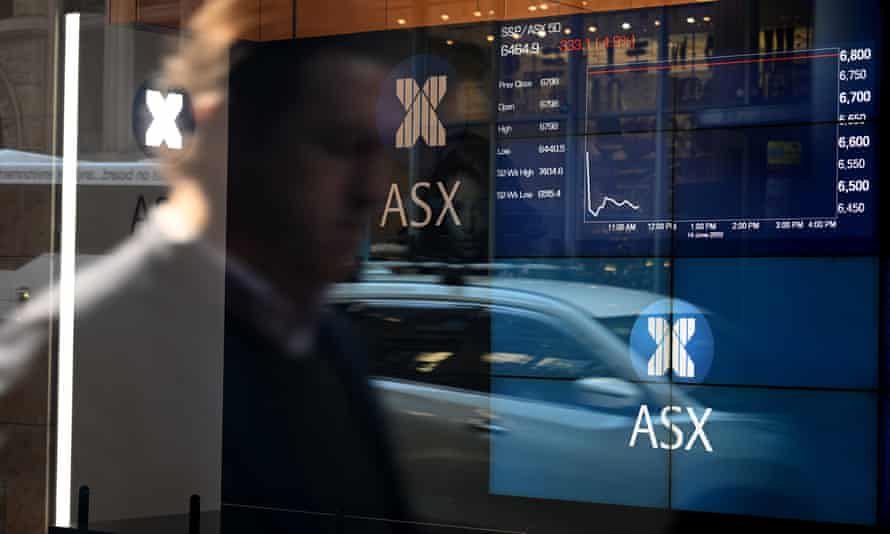
Ed Husic ‘absolutely agitated’ with gas companies
The industry and science minister Ed Husic has backed calls for a domestic gas reserve, saying there should be no supply issue in Australia given the amount of gas exported. He added that a windfall profits tax should be considered as a means of addressing the energy crisis.
Husic told the ABC’s RN Breakfast this morning that he was “absolutely agitated” with the gas companies, saying the government should send a signal that these businesses could no longer burden the public with this crisis:
I’ve got a great deal of sympathy for the view in the broader public that these are Australian resources that should be made available for use by households.
If we’re shipping out of some of our ports seven times the level of supply that is used by the Australian market in one year, it’s not an issue of supply here. This is not an issue that we don’t have the gas. It’s the supply that is available locally at a price that works for industry.
If interest rates were falling and banks were holding on to that and not passing on the interest rate cut to the wider community, one of the arguments we’d be putting is that that’s having an impact on the commercial environment for a lot of other businesses. And we’d be putting pressure on the banks to play ball.
I think we’re in similar sort of territory here with gas companies, and I think they do need to recognise the social licence that exists.
